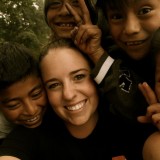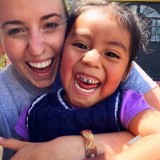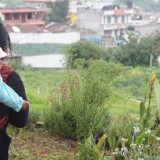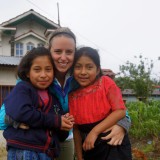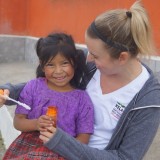Weaving a Good Cause into a Sustainable Business
August 22, 2014
While on a service trip to Guatemala, Chapman University alumna Amy Logan ’13 and her mother, Kathy Burt, witnessed something truly amazing. In the small town of San Martin Chiquito, they saw a group of women weavers working diligently to create bright, soulful tapestries.
These women lived in damp, dirty and impoverished conditions, often sacrificing meals to support their families. They usually spent their time boiling water on stoves in an attempt to purify bacteria-laden water. “That’s if they had water at all,” adds Logan.
But their beautiful tapestries told a different story.
“We saw hope in their eyes and a great deal of opportunity in their talents,” Logan says. “These women have little to nothing, yet they smile bigger than anybody I know and they love deeper than I ever imagined possible.”
Logan and her mother were instantly inspired.
“Carry for a Cause”
Because the women did not have the means to leave their village or sell their products to make a living off their hard work, Logan and her mother saw an opportunity to form a mutually beneficial partnership.
Upon returning home, Logan and her mother created JOJI Bags. This socially conscious business purchases tapestries from the women weavers and transforms them into high-end purses sold in the United States. Although it is still in its start-up phase, JOJI Bags is already helping to improve lives in San Martin Chiquito.
Developing a socially responsible business model seems to be a trend among young Chapman alumni. Megan MacDonald ’02 achieved success with Sasa Designs by the Deaf, a jewelry-making business that employs hearing-impaired women in Kenya. And Hannah (Taylor) Skvarla ’10 launched her business, The Little Market, which partners with artisans in developing countries and connects them to customers through an online marketplace.
“I think that people should be more responsible when it comes to their purchases,” says Logan. “I love that more businesses are including a give back component in their business models.”
Logan says that focusing on people over profit is filled with more rewards than she could ever have imagined. “The feeling you get when you know you’re making a difference in the lives of others—that’s what it means to be truly fulfilled.”
A Booming Business
Logan says that her public relations degree from Chapman has helped her to turn what was once a dream into a reality.
“Starting a business takes a great deal of marketing and advertising knowledge, both of which I learned at Chapman,” says Logan. She adds that her professors taught her real-world skills that she uses on a daily basis.
Professor Janell Shearer helped Logan with her initial marketing plan for JOJI Bags during a desktop publishing course at Chapman.
“I always like to see my students choose projects that will have a life beyond the classroom,” says Shearer. “JOJI Bags has a great, very personal story to tell and the products are beautiful.”
It is not surprising that the business’ slogan is “carry for a cause.” Buying a JOJI Bag is more than a style, it is a chance to change a life. Logan hopes to grow the company so she can employ more weavers and continue to improve the living conditions in San Martin Chiquito.
Waves of Opportunity
Over the years, Logan and her mother, in addition to their partner organization, Xela AID Partnerships for Self-Reliance, have developed a deep connection with the weavers.
One of the weavers, Maria Luciana Perez Lopez, says JOJI Bags has made a noticeable difference in her life. “It’s an art I’m proud of, and it helps support my family,” says Lopez. Because JOJI Bags helped to double her salary, she can now afford to pay tuition to keep her children in school.
In addition to supplying a stable income, JOJI Bags helps to provide health care, educational scholarships and skill-building exercises to the entire community—and they even take the women on field trips. A beach trip was the first time many of the women had ever left their tiny village.
“I’ll never forget their reactions as they cried tears of joy and jumped into the crashing waves with absolutely no idea of what they were experiencing,” says Logan.
She watched the women stare in disbelief at the wide open world now in front of them. “Moments like these remind me why I do what I do, and justify that I’m exactly where I need to be.”



